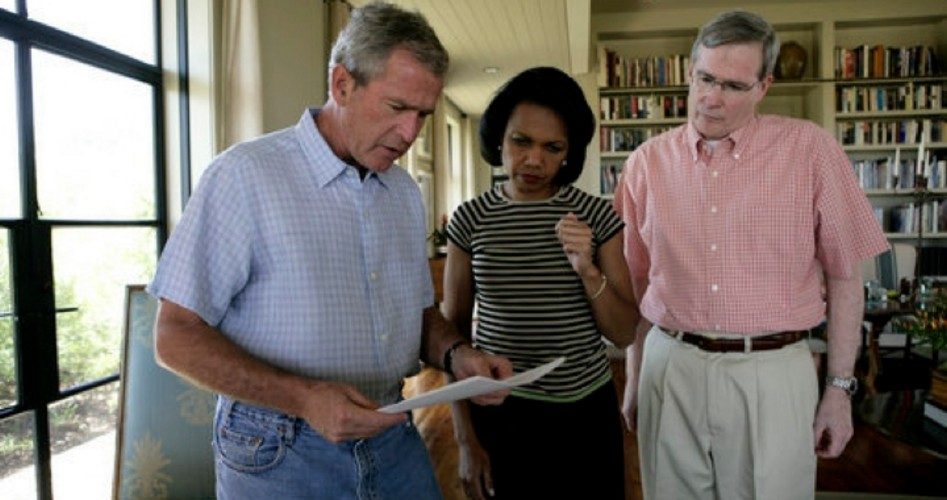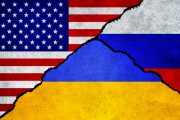
Many of the seemingly objective experts recently appearing in the news media to discuss the pros and cons — mostly the pros — of U.S. military action against Syria are anything but disinterested parties to the debate, yet their conflicts of interest were seldom mentioned by the outlets that provided them with platforms for their opinions. That’s the conclusion of a new study from the nonprofit Public Accountability Initiative (PAI).
“The media debate surrounding the question of whether to launch a military attack on Syria in August and September of 2013 was dominated by defense industry-backed experts and think tanks,” reads the report. “These individuals and organizations are linked to dozens of defense and intelligence contractors, defense-focused investment firms, and diplomatic consulting firms with strong defense ties, yet these business ties were rarely disclosed on air or in print.”
PAI identified 22 commentators and seven think tanks whose defense-industry ties should have been disclosed because such connections could have colored their views on the wisdom of U.S. intervention in the Syrian civil war. The commentators made a combined 111 media appearances, but in just 13 of those appearances were their potential conflicts of interest disclosed, and then generally not in full.
“We found lots of industry ties. Some of them are stronger than others. Some really rise to the level of clear conflicts of interest,” PAI director Kevin Connor told the Washington Post. “These networks and these commentators should err on the side of disclosure.”
Perhaps the most egregious example of a pro-war commentator whose conflicts of interest should have been disclosed is Steven Hadley. Hadley (shown on right), a former national security advisor to President George W. Bush (shown on left), “made a series of high-profile media appearances” strongly favoring U.S. military action in Syria, the report said. Among his appearances was a September 8 Post op-ed in which he wrote, “Every American committed to preventing Iran from obtaining a nuclear weapon should urge Congress to grant President Obama authority to use military force against the Assad regime in Syria.”
Regarding these appearances, PAI observed:
In each case, Hadley’s audience was not informed that he serves as a director of Raytheon, the weapons manufacturer that makes the Tomahawk cruise missiles that were widely cited as a weapon of choice in a potential strike against Syria. Hadley earns $128,500 in annual cash compensation from the company and chairs its public affairs committee. He also owns 11,477 shares of Raytheon stock, which traded at all-time highs during the Syria debate ($77.65 on August 23, making Hadley’s share’s [sic] worth $891,189). Despite this financial stake, Hadley was presented to his audience as an experienced, independent national security expert.
Indeed, during only one of Hadley’s appearances were any of his conflicts even mentioned, and then just barely. CNN’s John Berman informed his audience that Hadley is “with the consulting firm RiceHadleyGates” but did not elaborate on the fact that, according to PAI, “the firm advises companies on their international strategies, including foreign policy and national security matters. One example of its work highlighted on its website: ‘Providing information and analysis to help a client manage the changes to its business brought about by the Arab Awakening.’”
Retired Marine Gen. Anthony Zinni turned up in the media many times during the Syria debate, favoring U.S. action “because the president laid a red line down” (as he told CBS This Morning) that the Syrian government allegedly crossed. What neither he nor his hosts told viewers is that he is also on the board of directors of BAE Systems, a military services company with $6.1 billion in federal contracts last year; was chairman of the board and acting CEO between 2009 and 2012; and is also a member of the advisory board of DC Capital Partners, a private equity firm that invests in defense contractors. What’s more, Zinni is a distinguished senior advisor at the Center for Strategic and International Studies, a think tank cited by PAI for having “more defense industry connected advisors than most think tanks, including at its highest level of leadership.”
Frances Townsend currently serves as CNN’s national security analyst and made six appearances on the network’s Anderson Cooper 360 in which she stumped for not just limited air strikes on Syria but “a ‘full comprehensive strategy’ without limits set by Congress,” PAI wrote. Each time she appeared, Townsend, a former homeland security advisor to President George W. Bush, was identified as a member of the advisory committees of the Central Intelligence Agency and Department of Homeland Security. Left unsaid was the little matter of Townsend’s senior positions at a defense contractor and at two firms that invest in the defense industry.
Retired Army Gen. Jack Keane made 13 appearances on a variety of outlets. “In every appearance,” noted PAI, “he has expressed strong support for striking Syria.” In none of those appearances, however, did anyone see fit to point out that Keane stood to profit from war: He is a director at defense contractor General Dynamics, which received $15 billion in federal contracts in 2012, and is a partner in SCP Partners, a private equity firm with defense and security investments. In addition, Keane is the chairman of the board of the Institute for the Study of War (ISW), whose corporate council PAI describes as “a who’s who of the defense industry” — a detail seldom mentioned whenever ISW and its analysts are cited in the media.
The other generally pro-intervention think tanks on PAI’s list, all of which have donors and leaders from the upper echelons of the defense industry, are the Brookings Institution, the Council on Foreign Relations, the American Enterprise Institute, the Atlantic Council, and the Center for American Progress.
Are all these individuals and organizations promoting war strictly for the love of mammon? LewRockwell.com blogger Daniel McAdams argued that such a characterization would be “unfair.” Instead, he suggested, these people “are true believers first and profiteers as a consequence of that philosophy.”
He did note, however, that they “are allowed exclusive access to the American public by the corporate media”; and, in fact, PAI’s report is a much greater indictment of the media than of the experts upon whom they choose to call. It is telling that the Post’s editorial page editor, Fred Hiatt, defended his printing of Hadley’s piece without appropriate disclosure and that Fox News executive Michael Clemente told the paper that his network, which featured many of the analysts named by PAI, discloses conflicts of interest “when our judgment is that it’s journalistically germane to the story.” The news media, it appears, are so aligned with the government’s interests that they either fail to recognize their preferred analysts’ obvious conflicts of interest or deliberately suppress these facts. Either way, the result is that only one side of any argument — the government’s — is presented, and it is presented as if it were the only respectable, reasonable viewpoint.
Next time you see a so-called expert opine on the necessity of this or that intervention, whether domestically or abroad, be sure to follow the money to see if the speaker might have some ulterior motive in advocating that particular policy. Clearly, you can’t depend on the media to do that for you.

